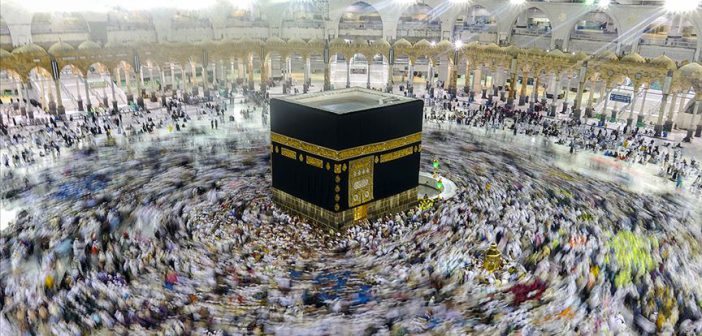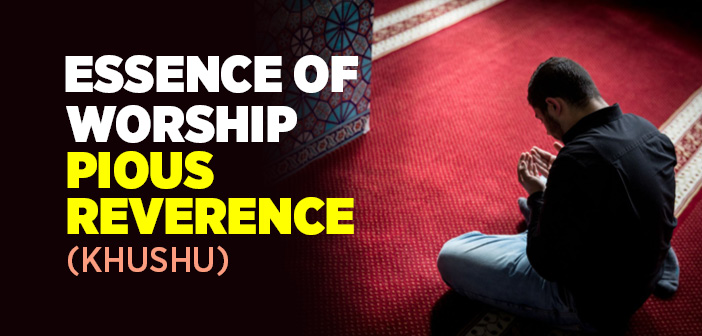What are optional prayers in Islam?
In a Hadith-i-Qudsi -a tradition that was communicated by Allah by inspiration to the Prophet (J) and related by him as if Allah was speaking:
“Whoever bears enmity to My saintly servant I will proclaim war on him. The thing that I like most among the acts that bring My servant closer to me is his performance of the acts that I enjoined on him. At the same time, My servant keeps coming closer to Me through optional worship. In the end he attains My Love. And when I love him I become the ears that he hears with; I become the eyes he sees with, I become the hands that he holds with, I become the feet that he walks with (I become the heart that he reasons with, and I become the tongue that he speaks with). When he asks for anything from Me, I immediately grant it to him. When he seeks refuge in Me, I safeguard him. I never hesitate about anything as I do in taking the life of a believing servant: He dislikes death, and I do not like anything he dislikes…” (Bukhari, Rikak, 38).
Therefore, pious Muslims, following the tradition of the Prophet (J) offer optional prayers in times of fear, during the latter part of the night and at other times, and when they need something- in addition to performing the obligatory prayers. They are among those who are praised in the Qur’an:
”.. On their faces are their marks, (being) the traces of their prostration.” (Fath, 48:29).
They get endless pleasure from prayer and optional prayers are offered to keep up this endless pleasure. The Prophet (J), though he committed no sin, used to pray at nights until his feet became sore, and he used to read the Qur’an until he was exhausted. So, optional prayers do not hinder obligatory prayers but, on the contrary, fortify them. The point here is to try to perform them in their proper way.
The Prophet (J) says:
“The first worship that the servant will be questioned about on the Day of Judgment is prayer. If his prayers are done properly, he will be saved. If not, he will be among the losers. If the obligatory prayers are not enough to save him, Allah will ask:
‘Are there optional prayers done by My servant so that they could complement the obligatory prayers?’
Other worship will be the same.” (Tirmizi, Salat, 188).
So, regarding obligatory prayers as sufficient will be a grave mistake, for it is almost impossible to perform the obligatory ones perfectly and duly. No matter how much weight we give to them we may, any time, make mistakes in our performance. Thus, we have no other chance, but optional prayers to complement our mistakes. Our deficiencies in offering the obligatory ones may be complemented by optional ones as we do not have a second chance to perform the obligatory prayers in case we miss or perform them incorrectly. However, this does not mean that we should leave out the obligatory prayers for optional ones. We should try to observe both at the same time. The practice of the Prophet (J) in this regard is a unique example before us. On the other hand, those who did not offer obligatory prayers in time should not try to supplement only the unperformed prayers, but try to offer optional prayers as unperformed prayers could be done any time of the day whereas such optional prayers as those done during the night, forenoon, the rising of sun, and late-evening are to be done only at certain times.
WISH ANYTHING YOU LIKE FROM ME!
Rabia bin Ka’b al-Aslamî said:
I used to stay with the Prophet at night and wait upon him to bring water for ablution and so forth. One day he told me:
“– Wish anything you like from me!”
I said:
“– I want to be with you in Paradise.”
He said:
“– What else do you wish?”
I said:
“– I only wish what I said.”
“– If so, please help me by offering as much prayer as you can!” (Muslim, Salat, 226).
Another saying of the Prophet (J) in this regard is as follows:
“Nothing is more helpful to the servant to approach Allah than prostrations s/he does in solitude. Namely, it is optional prayers that s/he does on his/her own at home that bring him/her close to Allah most.” (Ibn Mubarak).
Shaqeeq al-Balkhisaid:
We looked for five things and we found them in five things:
- 1. The fruitfulness of sustenance in forenoon prayer.
- The light in the grave in prayer done during the night.
- The answers to the questions asked by the two angels that question the dead in reading the Qur’an.
- The success in passing the bridge from this world to Paradise in fasting and giving alms.
- The shelter on the Day of Judgment in remembering Allah in solitude.
There are various optional prayers. The most important ones are as follows:
Dukha Prayer (Prayer done in the earlier part of the forenoon)
The Prophet (J) said:
”.. The words ‘Praise be to Allah’ is a charity; the words ‘Glory be to Allah’ is a charity; the words ‘There is no god but Allah’ is a charity; the words ‘Allah is Great’ is a charity; enjoining the good is a charity; detaining from evil is charity. And a dukha prayer of two units substitutes all of these.” (Muslim, Salat al-Musafirin, 81).
Aisha, wife of the Prophet, told:
“Once I saw the Prophet offering the dukha prayer, and I never left it out in my life afterwards.” (Bukhari, Muslim).
Awabeen Prayer (late-evening prayer)
The Prophet said:
“Whoever offers a prayer between the evening and late-night prayer, it is called the awabeen prayer.” (Ibn Mubarak, el-Raqaik).
Tahiyyat al-Masjeed Prayer (prayer done to greet the Mosque)
The Prophet said:
“Let one of you pray two units of prayer when s/he enters a mosque before sitting down!” (Bukhari, Salat, 60).
Tarawih Prayer (prayer performed after the prescribed night service of worship in the month of Ramadan)
Aisha, wife of the Prophet, (may Allah be happy with her) said:
“The Prophet was not so wrapped up in worships in other months as he was in the month of Ramadan. And he was particularly wrapped up in worships done during the last ten days of Ramadan.” (Muslim, Itikaf, 832).
The Prophet (J) says:
“Whoever spends a night of Ramadan offering prayer with a sincere belief and hope that s/he will get reward for it, his/her past sins are forgiven.” (Bukhari, Iman, 27).
And the primary prayer that is done in Ramadan is the tarawih prayer. It is done in twenty units. And as it takes a long time one is supposed to observe it duly.
Istikhara Prayer (prayer done before lying down to sleep in the hope that Allah will decide for the best between two or more options through a dream)
Jabir bin Abdallah said:
“The Prophet used to teach us the Istikhara prayer as if he was teaching us a chapter from the Qur’an…” (Bukhari, Tahajjud, 28).
Hajat Prayer (prayer done for the fulfillment of wishes)
The Prophet says about the hajat prayer through which the servant seeks refuge in Allah for the fulfillment of his/her wishes:
“Whoever wishes anything from Allah, let him/her make ablution properly first, and do two units of prayers afterwards. Then call Allah’s benediction to the Prophet, and finally say the following prayer:
‘There is no god but Allah, the Clement, and the Gentle. Praise be to Allah, the Master of the heavens. And praise be to Allah, the Lord of the universe.
O my Lord! I wish things that come out of Your Mercy, and I wish Your forgiveness, and I also wish to reach righteousness. O the Lord, the Most Compassionate! Please do not let any sin be unforgiven, any sorrow unrelieved, and any lawful wish declined!..” (Tirmizi, Witr, 17).
Tahajjud prayer (prayer performed by becoming awake after sleep at night) and other prayers offered at night-time
Every time has a specific feature in Allah’s sight. However, certain times are more valuable than others, and they are to be taken advantage of. And night-time is one of these times that the Qur’an and the sayings of the Prophet (J) describe as valuable.
The value that Allah ascribes to night-time and the secrets hidden in it are countless. Allah says: “The night and its homing!” (Inshiqaq, 84:17). “And by the night when it is still!..” (Dhuha, 93:2). The secret of the swearing of Allah by the night is a Divine window to get our hearts and souls to watch many facts.
The night is the time to prostrate before the Divine Being with love and affection for the sake of pleasing Him instead of lying down in smooth beds. Therefore, extra prayers performed at night are of great importance in achieving immediacy with Allah. Thus, one desires and performs prayers at night as much Divine Love as s/he has. It may be said that praying at night is like meeting and conversing with one’s lover at night. Being awake at a time when everybody is asleep means being included in the group of love and mercy.
The Prophet (J) used to pray at night until he was footsore. He was once asked:
“– O the Messenger of Allah! Why do you strain yourself though Allah declared in the Qur’an (in chapter 48) that you were forgiven of all your sins?”
He replied:
“– Should not I be a thanking servant?” (Bukhari, Tahajjud, 6).
The Prophet (J) also said:
“The most virtuous prayer except the obligatory prayers is the one offered by becoming awake after sleep at night.” (Muslim, Siyam, 202-203).
“Two units of prayer performed at night is more beneficial than anything in the world. If I thought that it would not be a burden on my people I would enjoin it on them.” (Fadail al-Amal, 257).
“There is a certain moment at night. If a Muslim catches that moment to wish something from Allah, that thing is granted to him/her.” (Tirmizi, Vitr, 16).
“If a man wakes up at night and also wakes his wife up to offer two units of prayer together, Allah registers their names among those who remember Allah most.” (Abu Dawud, Tatawwu, 18).
“Do not you ever disregard praying at night! Because it was a custom of righteous people before you. Worshipping at night brings one closer to Allah, atones for one’s sins, keeps the body from illnesses, and prevents one from performing sinful acts.” (Tirmizi).
“Let Allah show mercy to the man who wakes up at night to pray, and also wakes his wife up to do so. Let Allah show mercy to the woman who wakes up at night to pray, and also wakes her husband up to do so!” (Abu Dawud, Vitr, 13).
The Prophet (J) told Abu Zarr:
“– Do you get prepared when you are about to set forth on a journey?”
Abu Zarr replied:
“– Of course, o Prophet”
The Prophet (J) said:
“– Well, how do you think that the journey on the Day of Judgment will be? Take heed of what I will tell you; shall I tell you what you would benefit from on the Day of Judgment?”
Abu Zarr replied:
“– Yes, o Messenger of Allah!”
The Prophet (J) said:
“Fast on a very hot day for the Day of Judgment. Offer a prayer of two units at night to be saved from loneliness in the grave. Make the journey to Qabah once in a lifetime, and give alms to a needy person for the great occasions of the Doomsday. Say just words or save your tongue from saying unjust things!” (ibn Abi’d-Dunya, Kitab al-Tahajjud).
The Prophet (J) said to Abu Hurayra in this regard:
“O Abu Hurayra! If you want the company of the Mercy of Allah when in the grave and on the Doomsday, wake up at night to offer a prayer for Allah’s sake. O Abu Hurayra! If you pray at the corner of your house, your house lightens as a constellation in the sky, and it becomes like a star for the people of the world.” (Ihya al-Ulumiddin, I, 1023).
Abdallah bin Omar, for interpretation, let the Prophet (J) know one of his dreams through Hafsa, who was the sister of Abdullah and the wife of the Prophet (J). The Prophet (J) said while interpreting the dream:
“Abdallah is a great person. Yet, it would be superb if he prayed at night!..”
From that day on, Abdallah never abandoned praying at night. (Bukhari, Tahajjud, IV, 360).
The Prophet (J) said:
“The Archangel Gabriel said: ‘The honor of a believer is, no doubt, related to night-time prayer…’” (Hakim, Mustadrak, IV, 360).
One of the servants whom Allah is pleased with is one who gets out of his/her gentle and warm bed in order to offer the prayer of tahajjud. Allah is well-pleased with that servant and says to the angels:
“– What makes this servant of Mine care about praying at this time of the night?”
The angels reply:
“– It is his/her wish to attain Your Grace and Blessing, and also fear of Your punishment.”
Allah says:
“I grant him/her what s/he wishes from Me then. And I safeguard him/her from what s/he fears from.” (Fadail al-Amal, 299).
Many verses of the Qur’an call the servants to remember Allah at night-time.
“And during part of the night, (also), celebrate His praises, and (so likewise) after the postures of adoration.” (Qaf, 50: 40).
“And for the part of the night also praise Him, and at the retreats of the stars.” (Tur 52:49).
“Those who spend the night in adoration of their Lord prostrate and standing.” (Furqan 25:64).
Allah explains the features of those who will be saved from the Divine punishment and be placed in paradise:
“They were in the habit of sleeping but little by night. And in the hours of early dawn, they (were found) praying for forgiveness.” (Zariyat, 51:17-18).
In addition to this honoring, Allah cites those believers who remember Him at night-time as superior when comparing believers with disbelievers:
“What! he who is obedient during hours of the night, prostrating himself and standing, takes care of the hereafter and hopes for the mercy of his Lord! Say: Are those who know and those who do not know alike? Only the men of understanding are mindful.” (Zumar, 39:9).
As Allah describes those who devoutly worship at night as such, He forewarns those unwary servants who do not behave accordingly:
“And part of the night, prostrate yourself to Him; and glorify Him a long night through.”
“As to these they love the fleeting life, and put away behind them a Day (that will be) hard.” (Insan, 76:26-27).
The second part of the night is said to be more valuable. The Prophet (J) was once asked about it:
“– In which part of the night are the worships more likely to be accepted?”
He replied:
“The worships that are done in the second half of the night…” (Abu Dawud).
However, as it is not too easy to worship at night, one is supposed to observe some points. In addition to the strong desire to worship at night, one is supposed to have a light dinner and keep early nights. It is narrated that:
“The Prophet (J) used to discourage people to sleep before the late-night prayer, and he also used to discourage them to have long conversations after it.” (Bukhari, Mawaqit al-Salat, 23).
A Muslim should be in the habit of keeping early hours, and waking up early. There may be exceptions to that on condition that they should not hamper one’s activity to worship at night. Omar, the second caliph, says:
“The Prophet (J), sometimes, used to speak with Abu Bakr about the affairs of Muslims until daybreak. And I used to stay with them.” (Tirmizi).
These principles are necessary to remove the strain of waking up for prayer and also to untie the knots of Satan tied through sleep. The Prophet (J) says:
“When you sleep Satan ties three knots on the back of your neck. And he says to each knot ‘let a long night stay with you.’ When you wake up and cite the name of Allah one of the knots unties. When you make ablution another knot unties. And when you offer a prayer all of the knots untie. Thus, you wake up hale and hearty in the morning. Otherwise, you wake up asleep and downhearted.” (Bukhari, Tahajjud, 12).
So, it is clear that the prayer offered at night is so valuable that it comes second only after the obligatory prayers. However, those who do prayers at night are to be reminded that they should not be proud just because they do worship at night. If so, they lose the blessing they would get. They should always bear the following saying of the Prophet (J) in mind:
“There are many who worship at night, yet they get nothing out of it. They just stay awake.” (Ahmad bin Hanbal, Musnad, II, 373).
Source: Osman Nuri Topbaş, ISLAM SPIRIT AND FORM, Erkam Publications






